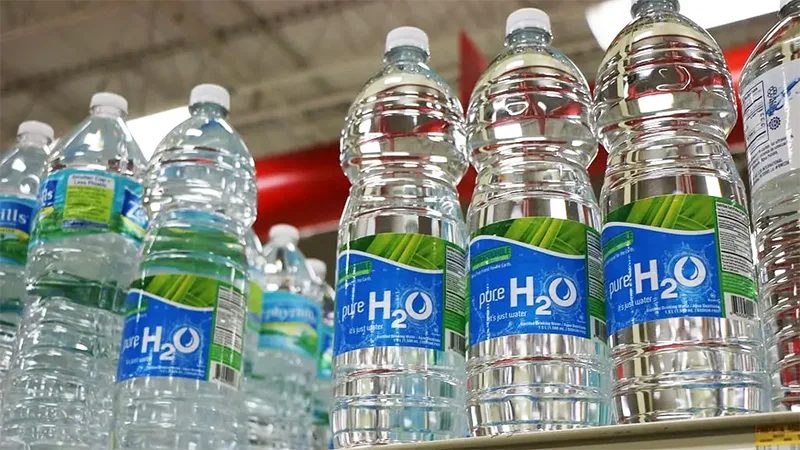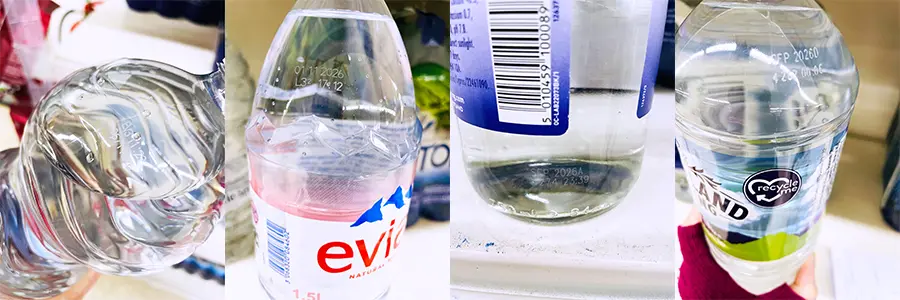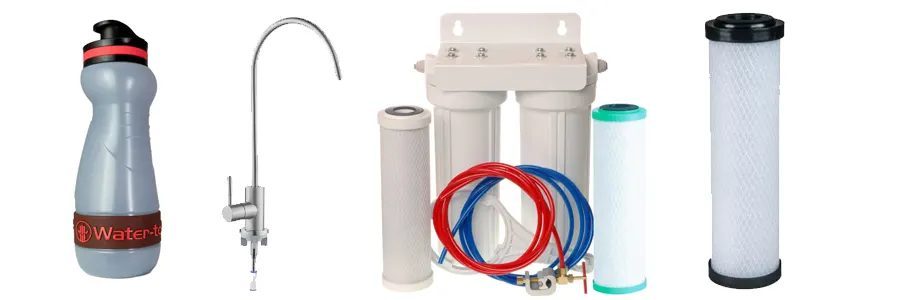how long does bottled water last
- Guides
- by Louise
- 09-01-2025

Does bottled water go bad?
If you’re a regular consumer of water from plastic bottles, and you’re storing those plastic bottles correctly and drinking them within a couple of years, the water won’t go bad, but the bottle will eventually start to degrade.
The whole concept of ‘can water expire’ is probably something that hasn’t even crossed your mind and we’ve probably peaked your interest on whether water can go out of date.
Some of the topics we’ll cover in this article will focus on how long bottled water lasts if it remains unopened, bottled water expiration dates, the possible contaminants when plastic bottles start to break down, and the best alternatives to buying and drinking water in plastic bottles.
You’ll notice that our concentration is on water bought in plastic bottles. Water can of course be purchased in glass bottles and aluminium cans.
How long does bottled water last unopened?
While undertaking some research for this article the consensus appears to be that unopened bottles of water should be kept for NO longer than two years.
There is a caveat to this and that is how you store your bottles of water.
We cover this in more depth later, but unopened bottles of water should be stored away from direct sunlight. Preferably in a cool, dark cupboard, and not outside.
Water in bottles that are kept in direct sunlight could impair the taste and smell of the water and this could be construed as water that has gone off.
Why do bottled waters have expiration dates?
Bottled water has an expiry date, but it’s normally stamped on plastic bottles of water as a ‘best before’ date rather than a ‘use by’ date. The ‘best before’ date is more concerned with the possible degradation in the plastic which could affect the quality of the water.

When we looked at different brands of bottled water on our local supermarket shelves it confirmed the two year ‘best before’ date that we’d read while doing our research.
Manufacturers of bottled water in the UK have already had to prove their bottled water is safe to drink and complies with permissible levels for chemical, pesticide, microbiological, and radioactive substances. The water must have been tested at a UKAS accredited laboratory that uses recognised scientific methods for testing bottled water.
We didn’t find a brand of bottled water that didn’t have a ‘best before’ date stamped on it.
We haven’t been able to find any UK regulations on whether bottled water companies are legally required to display expiry dates on bottled water. The requirement does not appear in The Natural Mineral Water, Spring Water and Bottled Drinking Water (England) Regulations 2007. We can surmise from this that there is no legal requirement for bottled water to have an expiry date and it’s the brands who choose to put one on because they feel they should. Expiry dates on products are incredibly useful for stock rotation.
We’d be happy to be corrected on the legality of expiry dates on bottled water if you think we are wrong.
The expiry date on bottled water is very subjective as it depends on how the plastic bottles are stored. Storage conditions will have a direct impact on the ultimate quality of the water inside the bottle.
Do you even take notice of expiration dates on bottles of water? Unless you’re a prepper, we can’t imagine why people would store unopened bottles of water for years, so this debate around ‘how long does bottled water last’ probably isn’t a topic of conversation that comes up for you very often.
How bottled water can become unsafe to drink
We consider that there are two main risks that could potentially make bottled water unsafe to drink.
The risks are microplastics and how the plastic bottles are stored.
Microplastics is our most serious concern.
Let’s look at microplastics first. Microplastics are pieces of plastic 5mm or smaller in size. To give a bit of context, a red blood cell is just over 5µm, that's 0.005mm.
There are MORE microplastics in bottled water than tap water.
A study by researchers at Colombia and Rutgers universities in the USA found that bottled water can contain up to 100 times more tiny pieces of plastic than previously thought. The average litre of bottled water contains almost a quarter of a million nano-plastic fragments. You can read more in this BBC article.
You may want to read our detailed blog post ‘How to filter and remove microplastics from drinking water effectively’ as that article will give you lots of useful information about how to remove microplastics with one of our drinking water filter systems.
The second risk is the plastic bottle that could render bottled water unpalatable.
Water is normally bottled in polyethylene terephthalate (PET). Over time, the plastic breaks down which may affect the taste and smell of the water, so you’d probably discard it after one mouthful as it wouldn’t taste very nice. PET itself does not contain chemicals that are harmful to health, such as phthalates or BPA. There are also no carcinogens in PET plastic.
We’re more concerned with how the plastic bottles are being stored. If plastic bottles are stored in excessive heat, exposed to sunlight, stored beside strong smelling chemicals or cleaning agents the quality of the plastic may degrade more quickly and taint the water inside.
Potential health risks of drinking expired bottled water
It’s up to you to consider the potential health risks of drinking bottled water, whether it’s expired or not. We have highlighted the risk of microplastics in bottled water and how bottled water is stored. It is up to you to make a considered choice when it comes to the bottled water you are purchasing.
We have read some horror stories out there on the internet about bottled water and we will never scaremonger people into believing they are true.
Best practices for storing and preserving bottled water
We’ve briefly touched on the importance of how bottled water is stored. If you do want to continue buying bottled water, then here are some useful tips (amongst other things!) on how to store water if you buy it in plastic bottles.
- Transfer the water from your plastic bottle into a reuseable aluminium bottle. This seems a sensible choice for when you’re out and about or prone to leaving plastic bottles of water rolling around on the back seat of your car.
- Don’t buy too much bottled water at a time. That way they’ll be no danger of those bottles of water going out of date.
- Only store sealed tamper evident plastic bottles of water. We don’t understand why people would store opened bottles of water, but people do some weird and wonderful things.
- Treat your bottles of water as you would any other food product. Store your plastic bottles of water in a cool, dust-free environment, away from direct sunlight and potential sources of contamination, such as strong smelling chemicals or diesel fumes.
- Never store bottled water outside or where it could be exposed to heat sources.
- Try not to leave bottles of water in your car, where it can heat up. There’s nothing worse than warm bottled water. This is especially important if you live in a warmer climate as water stored in your car is going to be exposed to excessive heat.
If your bottles of water are stored correctly the water should not deteriorate.
What are the best alternatives to bottled water?
Fountain Filters considers the best alternatives to bottled water are filtering your own kitchen tap water with a Water to Go bottle OR installing one of our under sink drinking water filters such as our Pearl T chlorine and taste filter.
The Pearl T is a good starter drinking water filter and will remove chlorine, sediments, microplastics (to 5 microns), forever chemicals (PFAS), and much more. You can of course opt for a 0.5 micron carbon block if you want to filter down to the sub-micron level.

Fountain Filters urges you to stop buying water in plastic bottles as there are better, cheaper ways to gain access to filtered drinking water and then you don’t ever need to stress about whether bottled water expires or not. You can even help other people when they ask you questions like ‘can bottled water go bad’? or ‘does bottled water expire’?
After what will be the best investment you can make for your home, your drinking water filter will save you money in the long term. Why? Because drinking water filters are much cheaper than buying bottled water.
If you’re now left wondering whether a water filter actually works, you’d be crazy not to read this article.
How Fountain Filters can help you move away from bottled water
Fountain Filters can help you in so many ways. We are passionate about helping people understand that there are better alternatives to filtered drinking water than continually buying water in single use plastic bottles.
Curiosity is a marvellous trait to have and we’re open to as many questions as you have when it comes to installing a drinking water filter in your home.
We say, who cares how long bottled water lasts, because after you invest in a drinking water filter, you’ll no longer have to worry about it.
FAQs
Is bottled water still good after 5 years?
If the bottles have been stored correctly, bottled water could still be good enough to drink after 5 years. But we’d question why you’re keeping a bottle of water for five years in the first place.
How to tell if bottled water is bad?
We know this is subjective, but if the bottled water has a strange taste or smell, don’t drink it.
Are old bottles of water safe to drink?
Potentially yes, old bottles of water are safe to drink if they have been stored correctly and have remained unopened.


